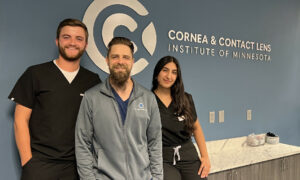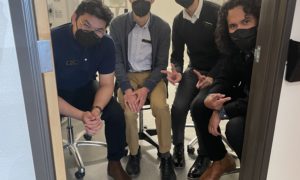By Cheryl G. Murphy, OD

“People will forget what you said, people will forget what you did, but people will never forget how you made them feel.” This quote by Maya Angelou can be applied not only to interactions with our patients, but also with our staff. Giving recognition and praise to staff when deserved helps you to retain good employees by fostering a sense of appreciation and value.
One summer during undergrad, I got hired as a bank teller at a credit union in a very small town in upstate New York. My experience at the bank taught me a lot about how to care for customers, and also, co-workers.
This small bank proved to be a sort of utopia in my early work experience. Everyone who worked there seemed to get along great because everyone respected one another. Everyone respected each other because everyone felt respected by the branch manager and vice versa. His name was Bill and he was not only one of the nicest bosses I ever had; he was also one of the most motivating. A dichotomy that may seem contradictory at first, but is it?
In “1501 Ways to Reward Employees,” Bob Nelson, Ph.D., says that “one of the strongest tools in a business arsenal for increasing motivation is recognition.” My boss Bill was good at sincerely praising employees for a job well done, and he had a knack for recognizing each person for the little things they did that kept the office running smooth. Nelson cites the work of Maritz, et al, who found that “employees who do receive recognition where they work are five times more likely to feel valued, seven times more likely to stay with the company, six times more likely to invest in the company, and 11 times more likely to feel completely committed to the company.”
The power of praise can hold a lot of weight when it comes to employees, and it is important to know that there are many non-monetary ways to show employees that they are valued.
In fact, Nelson says that “one of the most amazing and delightful ironies about the topic of recognition is that the most powerful forms of it cost little or nothing.” I’d like to think of the forms of non-monetary appreciation as broken into three categories: sincere wishes, sincere thanks and sincere praise. If you think I am overemphasizing sincerity, you are right. None of these acts carry the same weight if one is faking it.
Sincere Wishes:
At the bank, Bill would celebrate each employee’s special moments and milestones in life with a simple session of cake and coffee in the break room. We celebrated birthdays, retirements, babies, promotions, going away parties, new houses, etc. The cake I am sure cost the office next to nothing, but it was the effort that counted and the fact that he always seemed so sincere in his celebratory wishes. He really just wanted everyone to take a minute and revel in the moment. Everyone on staff would sit down together and really talk. We shared in one another’s company, and I believe we became a more cohesive team because of it.
Sincere Thanks:
Bill was also very good about saying “thank you” in the office, and that is something I have carried into my optometric career. Today, because of Bill, not only do I say thank you to patients and to the staff throughout the day, but I also say it at the end of the day. When all is shutting down and closing, I like to stop and sincerely thank the staff for all of their help that day citing specific examples when I can before I walk out the door. Popping in and out of exam rooms all day leaves little time for us to see all of the near-miss catastrophes and problematic situations that staff have calmly diffused all day without us needing to bear witness. A sincerely felt “thank you” for all of the behind-the-scenes shuffling and unseen acts of kindness that staff have done all day costs us nothing but means everything in that it can make the difference between a frantic day and one that is seamless. It shows the staff you truly appreciate their efforts.
Sincere Praise:
Not all jobs well done are unseen and unnoticed, so why do we sometimes act like we saw nothing when we witness an employee doing great work? You might wonder: “That’s what they get paid for, do we really need to stop and pat them on the back?” I would argue that if the task was above and beyond the call of duty then yes, praise is appropriate. By giving praise we can reinforce extraordinarily good behavior and increase its likelihood of returning.
If you see a staff member who has done something exceptional that day, week or month to help the business, fellow co-workers or a patient, say something. You can choose to personally praise the individual or to praise them publicly depending on the situation. The praise can be given out loud (“Great job! That was awesome. I like the way you handled that. Thanks!”), written in a short note of praise (see tips on what to write in a praise note below), or perhaps displayed on a bulletin board for all to see.
However you choose to deliver praise, be specific on what you are praising the person for and deliver the praise promptly after it is earned. You don’t have to wait until a scheduled performance review to tell someone they have been doing a good job; tell them that day.
If you are getting stuck on what to write in a praise note, according to Nelson,
high quality praise should communicate the following:
1. I saw what you did (specify).
2. I appreciate it.
3. That it was/is important because….
4. It made/makes me feel….
Some eyecare professionals may argue acts of praise are more mushy than profound, but I think that giving positive feedback to employees helps the business, and research has shown that if it is not given, it can have negative consequences such as people leaving their job. A survey conducted by a national staffing firm, Robert Half International, claimed that the number-one reason why people leave their jobs is lack of praise and recognition.
So what else can be done to help employees feel valued and appreciated? Below is a list of low- or no-cost ideas on how to start recognizing your staff.
Low or No-Cost Ideas for Recognizing Staff
(Excerpt from 1501 Ways to Reward Employees by Bob Nelson, PhD):
Personal thanks
Thank-you notes
E-mail praise
Voice-mail praise
Public praise
Pass-around trophy
Employee of the month parking space
Read positive letters from customers at staff meetings
Certificate of appreciation
Balloons and computer banners
Time off (extra break, long lunch, three-day weekend, leave early pass, etc)
Create an award (Golden Banana, Spirit of Fred, Order of the Extended Neck, etc)
Giving thanks and praise to staff should be easy, fun, and most of all, memorable–and it’s important. Remember, if you thank your staff now, you may be thanking yourself later.
In what ways do you recognize staff for a job well done? Do you find formal recognition (such as employee of the month) or informal recognition (writing a short note) works best? What ways do you use to praise employees when they do something above and beyond the call of duty? What non-monetary ways do you use to show employees they are appreciated and valued on a regular basis (time off, employee of the month parking spot, award, balloons)?
Cheryl G. Murphy, OD, practices at an independent optometric practice in Holbrook, NY. You can like her on Facebook or follow her on Twitter @murphyod. To contact her: murphyc2020@gmail.com.



























